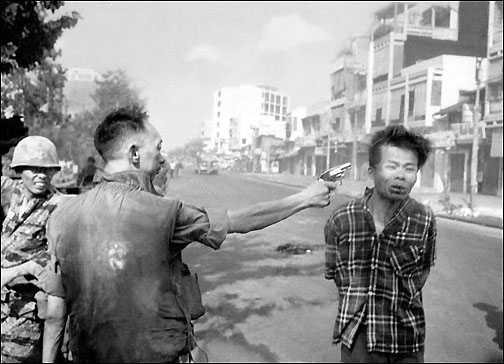A recurring theme in your writings is that people we detain on the battlefield have the same legal rights as US citizens. What's the basis for this? The only legal protections relative to warfare are the Geneva Conventions, and the US military Law of Land Warfare. Unless you know of a recent change, non-uniformed enemy combatants, commonly called spies, are still liable to summary execution. What legal grounds are you following to come to the conclusion that we should do more for these individuals? [italics are Spot's]Sigh. We've been through this before, haven't we boys and girls?
As a preliminary matter, the "summary execution" of anybody has another name: it's called an extra-judicial killing. This is a REALLY BIG NO NO in the international community. This, boys and girls, is an example of an extra-judicial killing that some of you may remember from the bad old days of the Vietnam War:

It is, of course, unlawful to execute an accused person without giving him a fair trial first. Two bodies of law apply—humanitarian law, which applies in an armed conflict, and human rights law, which applies even where the laws of war do not.Spot has written at length--those of you in the back of the room might say ad nauseum--about Common Article 3 of the Geneva Conventions. Just to be tedious, Spot reproduces Common Article 3 here:
Under international humanitarian law, the sorts of killings that took place in Hue are usually termed "willful killing without judicial process." If the victims are enemy prisoners of war (including accredited journalists and civilian suppliers and contractors attached to enemy armed forces), or medical or religious personnel attached to the armed services, such executions are grave breaches under the Third Geneva Convention. If they are enemy civilians, it is a grave breach of the Fourth Geneva Convention.
The requirements for fair trials of military personnel and civilians are similar. Each accused person has rights: against self-incrimination, against being convicted on the basis of an ex post facto law, for being advised of his or her rights, of having the right to counsel, to be told the particulars of the charge, to prepare a defense, to call witnesses, to have an interpreter, and to appeal. “As it is prohibited to kill protected persons during an international armed conflict, so it is prohibited to kill those taking no active part in hostilities which constitute an internal armed conflict,” the International Criminal Tribunal for the Former Yugoslavia said in November 1998. The key element is “the death of the victim as a result of the actions of the accused.” Even when it is unclear whether a situation is an armed conflict, human rights law forbids extrajudicial executions.
In the case of armed conflict not of an international character occurring in the territory of one of the High Contracting Parties, each Party to the conflict shall be bound to apply, as a minimum, the following provisions:
1. Persons taking no active part in the hostilities, including members of
the armed forces who have laid down their arms and those placed hors de combat by sickness, wounds, detention, or any other cause, shall in all
cases be treated humanely, without any adverse distinction founded on
race, color, religion or faith, sex, birth of wealth, or any other
similar criteria.To this end the following acts are and shall remain prohibited at any time
and in any place whatsoever with respect to the above-mentioned persons:
(a) violence to life and person, in particular murder of all kinds, mutilation, cruel treatment and torture;
(b) taking of hostages;
(c) outrages upon personal dignity, in particular humiliating and degrading treatment;
(d) the passing of sentences and the carrying out of executions without
previous judgement pronounced by a regularly constituted court,
affording all the judicial guarantees which are recognized as
indispensable by civilized peoples.2. The wounded and sick shall be collected and cared for.
This is the provision specifically that the Supreme Court said in Hamdam v. Rumsfeld that pertained to Iraq detainees, even if they weren't uniformed combatants, or maybe even civilians.
In other words Dave, if you have custody of anybody, this is the way you must treat them. They get this treatment because they are homo sapiens.
Technorati Tags: Common Article 3, extra-judicial killings
No comments:
Post a Comment